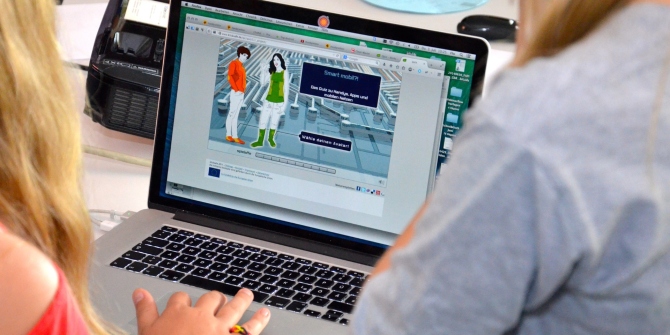
Last time I wrote about media literacy, I was glad to observe that, as the media increasingly mediate everything in society, there is growing emphasis on the importance of ensuring that people have the media literacy not only to engage with the media but to engage with society through the media. But I was also frustrated at some of the superficial hand-waving from policy makers towards media literacy and media education, seemingly without understanding what is involved or what the challenges are.
Silver bullet solution?
In our ever-more complex media and information environment, media literacy is being hailed as a silver bullet solution – hopefully to be dealt with by one-shot awareness-raising campaigns delivered by brand-promoting CSR departments, or by issuing vaguely-phrased high-handed injunctions to the (apparently unhearing and otherwise preoccupied) Department of Education. The motivation is rarely pedagogic but, rather, more the policy of ‘last resort.’
So, in the face of multiple problems of hate speech, or cyberbullying, or hacked YouTube content, or fake news etc., we are witnessing urgent calls to manage the media environment better – especially, to regulate the internet. But in the face of clashes of positive and negative rights, regulatory difficulties, powerful global companies and short-termist political expediency, this call in turn quickly morphs into a call for the supposedly ‘softer’ solution of educating the internet-using public.
Let me be clear. I am 100 per cent in favour of educating the public. I have devoted years to arguing for more and better media literacy. In this digital age, I believe media literacy’s time has come, and its advocates should grab the opportunity with both hands and advance the cause with all their energy.
But energy and enthusiasm are most effectively expended when the challenges to be met are properly recognised. So let me set these out, as I see them, lest our energies are wasted and the window of opportunity is lost.
First, three educational challenges
- Investment. Make no mistake: education is an expensive solution in terms of time, effort and infrastructure. It needs a pedagogy, teacher training, curriculum resources, mechanisms for audit and assessment. To manage schools, governments devote an entire ministry to achieve this – yet they are simultaneously heavily criticised for their failures, and yet constantly under siege to solve yet more of society’s pressing ills.
- Reaching adults not in education or training is an even larger challenge, rarely met in any area of demand. So who is responsible, and who are or should be the agents of change? The answers will vary by country, culture and purpose. But they should be identified so that the actions of civil society, public services such as libraries, industry and other private actors can be coordinated.
- Exacerbating inequalities. We like to think of education as a democratising mechanism, because everyone has the right to school and training. But research consistently shows that education affects life outcomes differentially, advantaging the already-advantaged and failing sufficiently to benefit the less-advantaged, especially the so-called “hard to reach.” What proportion of media literacy resources are provided equivalently to all (risking exacerbating inequality) and what proportion are targeted at those who most need them? (I don’t know the answer, but someone should know it).
Then there’s the challenges of the digital
- Mission creep. As more and more of our lives are mediated – work, education, information, civic participation, social relationships and more – the scope of media literacy grows commensurately. Just today, in my Twitter feed, I read exhortations to ensure that people:
- Understand how black-boxed automated systems make potentially discriminator decisions
- Distinguish the intent and credibility signalling behind mis- and dis-information to tackle “fake news”
- Identify when a potential abuser is using their smart home technology to spy on them
- Weigh the privacy implications when they use public services in smart cities
It is, therefore, vital to set some priorities.
- Legibility. As I’ve observed before: we cannot teach what is unlearnable, and people cannot learn to be literate in what is illegible… We cannot teach people data literacy without transparency, or what to trust without authoritative markers of authenticity and expertise. So people’s media literacy depends on how their digital environment has been designed and regulated.
- Postponing the positives. The rapid pace of socio-technological innovation means everyone is scrambling to keep up, and just battling with the new harms popping up unexpectedly is extremely demanding. The result is that attention to the “hygiene factors” in the digital environment dominates efforts – so that media literacy risks being limited to safety and security. Our bigger ambitions for mediated learning, creativity, collaboration and participation get endlessly postponed in the process, especially for children and young people.
For the media literacy community itself, there’s some very real challenges of expertise and sustainability. These may be dull, or even invisible, to those calling for the silver bullet solution. But they matter.
- Capacity and sustainability. The media literacy world comprises many small, enthusiastic, even idealistic initiatives, often based on a few people with remarkably little by way of sustained funding or infrastructure. The media literacy world is a bit like a start-up culture without the venture capitalists. We can talk a good story, but there’s always a risk of losing what’s been gained and having to start over.
- Evidence and evaluation. When you look closely at the evidence cited in this field, it’s not as robust or precise as one would like. Even setting aside the now tiresome debate over definitions of media literacy, the difficulties of measurement remain. Perhaps for the lack of agreed measures, there’s more evidence of outputs than outcomes, of short term reach rather than long term improvements. There’s remarkably few independent evaluations of what works. Compare media literacy interventions to other kinds of educational interventions – where’s the randomised control trials, the systematic evidence reviews, the targeted attention to specific subgroups of the population, the costed assessments of benefit relative to investment?
Last but certainly not least, there’s the politics of media literacy
- “Responsibilising” the individual. In policy talk especially, the call for media literacy and education to solve the problems of digital platforms tends, however inadvertently, to task the individual with dealing with the explosion of complexities, problems and possibilities of our digital society. In a policy field where governments fear they lack the power to take on the big platforms, it is the individual who must wise up, becoming media-savvy, rise to the challenge. Since, of course, the individual can hardly succeed where governments cannot, the politics of media literacy risks not only burdening but also blaming the individual for the problems of the digital environment.
As Ioanna Noula recently put it, “by emphasising kindness and ethics, these approaches also undermine the value of conflict and dissent for the advancement of democracy” and they “decontextualise” citizenship such that “the attentions of concerned adults and youth alike are turned away from the social conditions that make young people vulnerable.” So instead of empowered media-literate citizens exercising their communicative entitlements, the emphasis becomes one of dutiful citizens, as part of a moralising discourse.
How can we turn things around?
I’ll make three suggestions, to end on a positive:
Before advocating for media literacy as part of a solution to the latest socio-technological ill, let’s take a holistic approach. This means, let’s get really clear what the problem is, and identify what role media or digital technologies play in that problem – if any! We might even ask for a “theory of change” to clarify how the different components of a potential solution are expected to work together. And, getting ambitious now, what about a responsible organisation – whether local, national or international – tasked with coordinating all these actions and evaluating the outcomes?
Then let’s figure out all the other players, so that we can articulate which part of the solution media literacy may provide, and what others will contribute – regulators, policy makers, civil society organisations, the media themselves – thereby avoiding the insidious tendency for the whole problem to get dumped at the feet of media educators. We might further expect – demand – that the other players should embed media literacy expectations into their very DNA, so that all organisations shaping the digital environment share the task of explaining their operation to the public and providing user-friendly mechanisms of accountability.
Last, let’s take the questions of value, empowerment and politics seriously. What does good look like? Is it dutiful citizens being kind to each other online, behaving nicely in an orderly fashion? Or is it deliberating, debating, even conflicting citizens? Citizens who express themselves through digital media, organise through digital media, protest to the authorities and insist on being heard? I think it should be the latter, not least because our societies are increasingly divided, angry and dis-empowered. It’s time that people are heard, and it’s time for the digital environment to live up to its democratising promise. But this requires change on behalf of the policy makers. We should not only ask whether people trust media, or trust the government. We should also ask whether the media trusts the people and treats them with respect. And whether governments and related authorities and civic bodies trust the people, treat them with respect, and hear what they say.
♣♣♣
Notes:
- This blog post appeared originally on LSE Media Policy Project.
- The post gives the views of its author(s), not the position of LSE Business Review or the London School of Economics.
- Featured image credit: Photo by albersHeinemann, under a CC0 licence
- When you leave a comment, you’re agreeing to our Comment Policy.
 Sonia Livingstone, OBE, is professor of social psychology in the department of media and communications at LSE. She teaches master’s courses in media and communications theory, methods, and audiences and supervises doctoral students researching questions of audiences, publics and youth in the changing digital media landscape. She is author or editor of nineteen books and many academic articles and chapters. She has been visiting professor at the Universities of Bergen, Copenhagen, Harvard, Illinois, Milan, Oslo, Paris II, and Stockholm, and is on the editorial board of several leading journals. She is a fellow of the British Psychological Society, the Royal Society for the Arts, and fellow and past president of the International Communication Association, ICA. Sonia has received honorary doctorates from the University of Montreal and the Erasmus University of Rotterdam. She was awarded the title of Officer of the Order of the British Empire (OBE) in 2014 ‘for services to children and child internet safety.’
Sonia Livingstone, OBE, is professor of social psychology in the department of media and communications at LSE. She teaches master’s courses in media and communications theory, methods, and audiences and supervises doctoral students researching questions of audiences, publics and youth in the changing digital media landscape. She is author or editor of nineteen books and many academic articles and chapters. She has been visiting professor at the Universities of Bergen, Copenhagen, Harvard, Illinois, Milan, Oslo, Paris II, and Stockholm, and is on the editorial board of several leading journals. She is a fellow of the British Psychological Society, the Royal Society for the Arts, and fellow and past president of the International Communication Association, ICA. Sonia has received honorary doctorates from the University of Montreal and the Erasmus University of Rotterdam. She was awarded the title of Officer of the Order of the British Empire (OBE) in 2014 ‘for services to children and child internet safety.’





